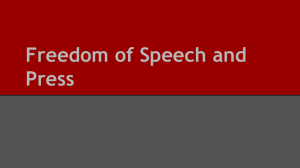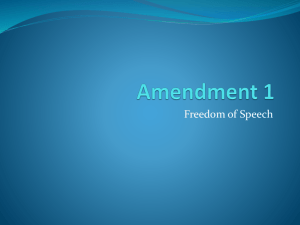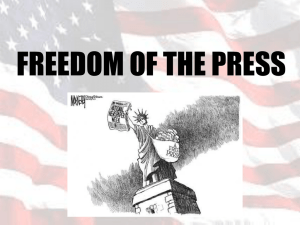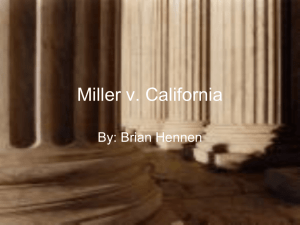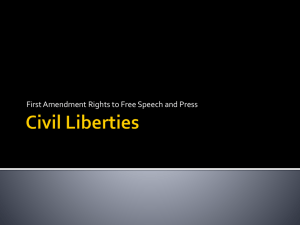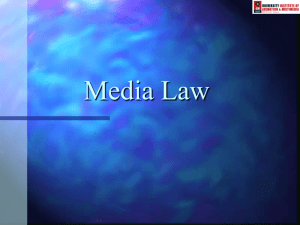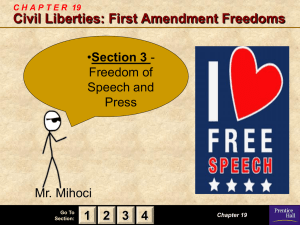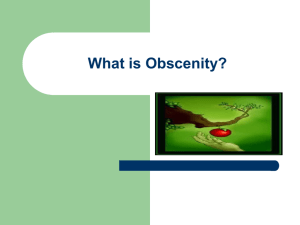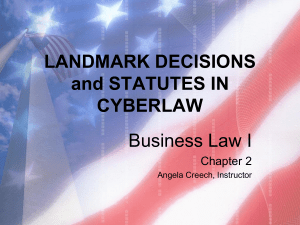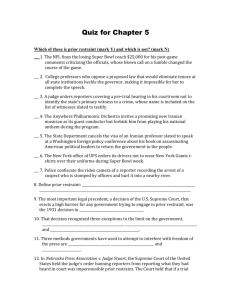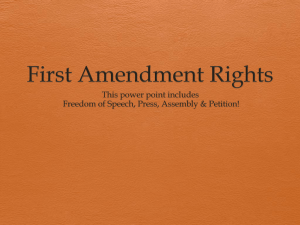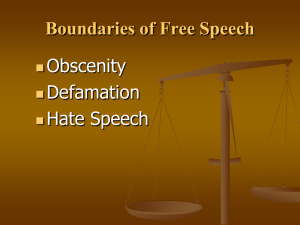Freedom of Press
advertisement
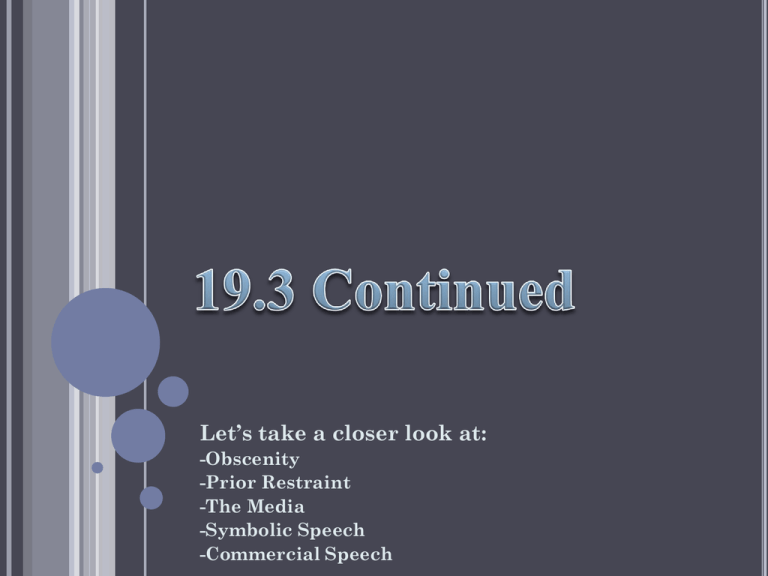
Let’s take a closer look at: -Obscenity -Prior Restraint -The Media -Symbolic Speech -Commercial Speech PRIOR RESTRAINT The Constitution allows government to punish some utterances after they are made (treason, libel, etc . . .). But, with almost no exceptions, government cannot place any prior restraint on spoken or written words, except in the most extreme situations, government cannot curb ideas before they are expressed. NEAR V. MINNESOTA (1931) The Supreme Court struck down a State law that prohibited the publication of any “malicious, scandalous, and defamatory” periodical. Acting under that law, a local court had issued an order forbidding the publication of the Saturday Press. That Minneapolis paper had printed several articles charging public corruption and attacking “grafters” and “Jewish gangsters”. The Court held that the guarantee of a free press does not allow a prior restraint on publication, except in such extreme cases as wartime, or when a publication is obscene or incites violence. New York Times v US (1971) Pentagon Papers was a classified, stolen government report charting the escalation of the US in Vietnam The New York Times got a copy and was going to publish it – the Nixon administration said it would endanger troops in the war The court said it could still be published SCHOOL NEWSPAPERS The Court has also said that public school officials have a broad power to censor school newspapers and plays, as well as other “school-sponsored expressive activities”. In Hazelwood School District v. Kuhlmeier (1988), it held that educators can exercise “editorial control over the style and content of student speech in school-sponsored expressive activities so long as their actions are reasonably related the legitimate pedagogical concerns”. Pedagogical: Educational, Academic, instructive Libel/Slander The media can be sued for libel (written) and slander (spoken) if they publish material that 1) is false, 2) harms someone’s reputation, and 3) Public figure – actual malice Private figure – willful negligence COMMERCIAL SPEECH ‘Commercial speech’ is speech for business purposes; the term refers most often to advertising. Until the mid-1970s, it was though that the 1st Amendment did not protect such speech. In Bigelow v. Virginia (1975), the Supreme Court held that a State law was unconstitutional which prohibits the newspaper advertising of abortion services. NOTE: Not all commercial speech is protected, however. Thus, government can and does prohibit false and misleading advertisements, and the advertising of illegal goods and services. Broadcast Radio and Television Both radio and television broadcasting are subject to extensive federal regulation. Most of this regulation is based on the often-amended Federal Communications Act of 1934, which is administered by the Federal Communications Commission. Regulation is allowed because there is limited space over broadcast waves. Other areas (I.E., Cable) are not censored. In Red Lion Broadcasting Co. v. FCC (1969), the Supreme Court acknowledged “of all forms of communication, it is broadcasting that has received the most limited 1st Amendment protection”. Not included: newspapers, magazines, cable, Internet Obscenity The court has held that obscenity is not protected by the First Amendment. But what is obscene?? MILLER V. CALIFORNIA (1973) The leading obscenity case in the Supreme Court, established a three part obscenity test. Miller, after conducting a mass mailing campaign to advertise the sale of "adult" material, was convicted of violating a California statute prohibiting the distribution of obscene material. A book, film, recording, or other piece of material is legally obscene if… “the average person applying contemporary [local] community standards” finds that the work, taken as a whole, “appeals to the prurient interest”—that is, tends to excite lust; “the work depicts or describes, in a patently offensive way” a form of sexual conduct specifically dept with in an anti-obscenity law; “the work, taken as a whole, lacks serious literary, artistic, political, or scientific value”. INTERNET United States v. American Library Association (2003) – Publicly funded libraries must block their computers from pornographic content and websites if they recieve federal money. Reno v ACLU (1996) – It is unconstitutional to block minors access to “Obscene and Indecent” materials because it impedes adult access to that material CONFIDENTIALITY Many reporters and news organizations argue that they must have the right to refuse to testify, the right to protect their sources. They argue that, without this right, they cannot insure confidentiality, and therefore many sources will not reveal information needed to keep the public informed. Many State and federal courts have generally rejected the news media’s argument. REPORTERS WANTING TO NOT TESTIFY! States 36 state legislatures have granted reporters immunity from having to name sources from state law enforcement Judith Miller Refused to reveal her source in an investigation of who divulged the name of a CIA agent She was jailed for 3 months for contempt of court until her source told her it was OK to name him.
